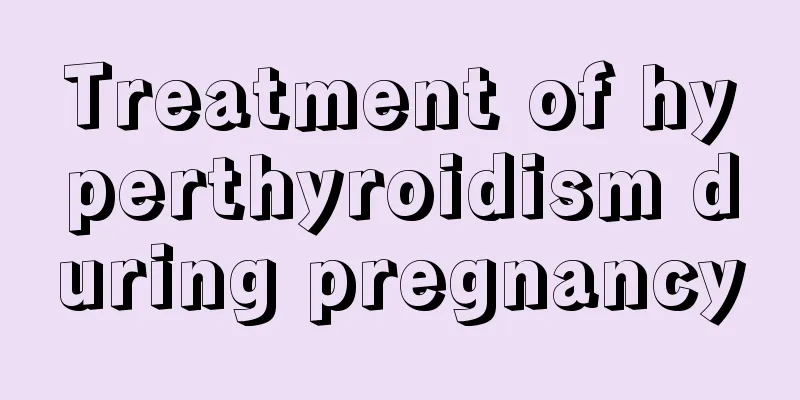Treatment of hyperthyroidism during pregnancy

|
Many people may not know much about the treatment of hyperthyroidism during pregnancy. However, the increasing number of people suffering from this disease recently has caused great harm to the health of many of our female friends. Early treatment is very necessary to reduce unnecessary risks of the disease. I believe everyone must be very interested in this. Let us learn about the treatment of hyperthyroidism during pregnancy. Female patients with hyperthyroidism often worry that their hyperthyroidism will affect their fertility. In fact, under the supervision of endocrine specialists, female patients with hyperthyroidism can give birth to a healthy and lively baby like normal women. However, the timing of pregnancy should be chosen after hyperthyroidism has been systematically treated and the condition has been basically relieved, and after obtaining the consent of the endocrinologist and obstetrician and gynecologist. Otherwise, if you get pregnant without treatment, it may cause premature birth, miscarriage, fetal growth retardation, or even hyperthyroidism crisis during delivery. Hyperthyroidism patients should pay attention to the following points after pregnancy: 1. Strictly implement perinatal monitoring: The period from pregnancy, delivery to postpartum is called the perinatal period. During this period, the following should be done: ① Regularly check the thyroid hormone in the blood to keep it at a slightly higher level than normal. If the value is normal, use less or no medication. ②Adjust the dosage of the medicine. ③Avoid all kinds of infections and seek prompt treatment if any infection occurs. ④ Before and after delivery, the patient must be hospitalized for observation under the supervision of an obstetrician and gynecologist and an endocrinologist. If there are any signs of hyperthyroid crisis, they should be treated early. ⑤ Pay attention to the pattern that the symptoms of hyperthyroidism worsen in the early stage of pregnancy, improve in the middle and late stages, and relapse and worsen 2-6 months after delivery, and strengthen monitoring and treatment. 2. Selection of anti-thyroid drugs: Pregnant women with hyperthyroidism should seek guidance from an endocrinologist on medication as soon as possible, and monitor the mother's blood hormones to ensure that it reaches mild hyperthyroidism or thyroid function is at the upper limit of normal values, so as to prevent fetal hyperthyroidism or hypothyroidism. Currently, the most commonly used drugs for the treatment of hyperthyroidism are imidazoles and thiouracil drugs, which can generally be used by non-pregnant hyperthyroidism patients. The above content introduces us to the treatment of hyperthyroidism during pregnancy. All our female friends should pay great attention to this. We should think that this kind of treatment can be carried out in time and effectively to avoid the disease from causing more harm to our body. At the same time, we need to pay great attention to all aspects in our future life. |
<<: Treatment of hypothyroidism during pregnancy
>>: What to do about endocrine disorders and menstrual disorders
Recommend
What should I do if my menstrual period is always unclean?
If menstruation is often not clean, it may be due...
What is the reason for the itchy yellow vaginal discharge?
Many women will be troubled by leucorrhea in thei...
Should you throw toilet paper down the toilet? How to use a toilet brush
It is really annoying to have a smell in the toil...
What vegetables are best for pregnant women to eat?
Pregnancy is a special period in a woman's li...
Pregnancy skin care products contain fragrance
For pregnant women, the selection of skin care pr...
What are the reasons for children's picky eating? What are the consequences of children's picky eating?
Nowadays, many families have only one child, so p...
Is it normal not to have morning sickness in early pregnancy?
Many expectant mothers feel very painful after ha...
What is the reason for girls to have blood in their stool
Bleeding in the stool may not be a symptom that o...
What is the cause of yellow leucorrhea caused by gynecological inflammation?
Gynecological diseases are very common among wome...
Wearing high heels toe lumps
Bumps on the toes caused by wearing high heels us...
What are the reasons for delayed menstruation?
Menstruation is the best proof of fertility for w...
Can pregnant women use oral ulcer patches?
Oral ulcer patch is a commonly used medicine for ...
Interesting fact: What are the uses of the red house and hot air balloon you see during an eye test?
"Look at the red house in the middle of the ...
Can I drink coffee during menstruation?
Women who like to drink coffee say that drinking ...
Female stomach pain on the right side
Many people suffer from inflammation of the stoma...









